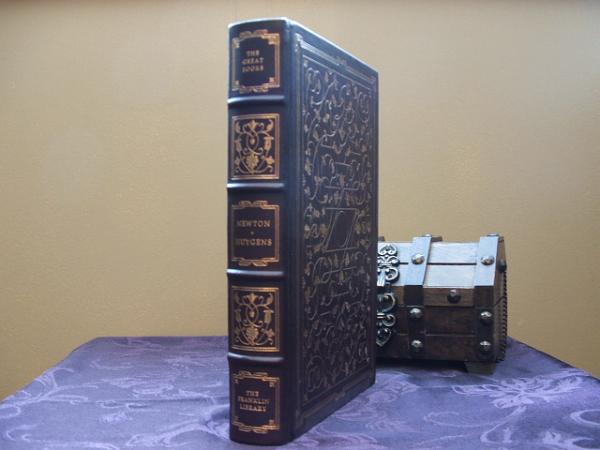Easton Press Isaac Newton books
Principia - 2000In the Presence of the Creator, Isaac Newton and His Times - Gale E. Christianson
Franklin Library Isaac Newton books
Works of Christiaan Huygens and Isaac Newton - Great Books of the Western World - 1985
Franklin Library Isaac Newton books
Works of Christiaan Huygens and Isaac Newton - Great Books of the Western World - 1985Isaac Newton biography
Isaac Newton, born on December 25, 1642, in Woolsthorpe, Lincolnshire, England, emerged as one of the most influential scientists in history, whose profound contributions revolutionized our understanding of the natural world. His life story is marked by unparalleled intellect, relentless curiosity, and groundbreaking discoveries that laid the foundation for modern physics and mathematics. Growing up in a farming family, Newton faced early hardships, including the premature death of his father before his birth. Raised by his mother and maternal grandmother, he exhibited extraordinary intellectual abilities from a young age, excelling in academics despite facing financial constraints. In 1661, Newton enrolled at Trinity College, Cambridge, where he immersed himself in the study of mathematics and natural philosophy. It was during this time that he delved into the works of renowned scientists like Galileo Galilei and Johannes Kepler, laying the groundwork for his future endeavors.Newton's breakthrough came in 1665 when the Great Plague forced the closure of Cambridge University, prompting him to return to his family estate in Woolsthorpe. During this period of isolation, now famously known as his "annus mirabilis" or "year of wonders," Newton made astonishing discoveries in mathematics, optics, and physics. In optics, Newton conducted experiments with prisms, demonstrating that white light is composed of a spectrum of colors and inventing the reflecting telescope, which revolutionized astronomical observation. His findings were compiled in his groundbreaking work, "Opticks," published in 1704. However, Newton's most enduring contributions came in the field of physics. Building upon the works of earlier thinkers, he formulated his three laws of motion, which laid the foundation for classical mechanics. His law of universal gravitation, proposed in his seminal work Philosophiæ Naturalis Principia Mathematica (Mathematical Principles of Natural Philosophy) in 1687, described the force of attraction between all objects in the universe, explaining the motion of celestial bodies and terrestrial objects alike.
Newton's laws and the law of gravitation provided a comprehensive framework for understanding the physical world, fundamentally altering humanity's perception of the cosmos. His mathematical formulations enabled precise predictions of planetary motion, facilitating advancements in astronomy, navigation, and engineering.
Beyond his scientific endeavors, Newton was a complex figure, characterized by his introverted nature, intense focus, and occasional bouts of temper. He served as a professor at Cambridge University, later becoming Warden and Master of the Royal Mint, where he played a crucial role in reforming England's currency. Isaac Newton's profound impact on science and mathematics reverberates to this day, shaping our understanding of the universe and inspiring generations of scientists and thinkers. His legacy as a towering figure of the scientific revolution endures, immortalizing him as one of history's greatest minds. Isaac Newton passed away on March 20, 1727, leaving behind a legacy that continues to illuminate the path of scientific inquiry.

Comments
Post a Comment
Share your best book review and recommendation